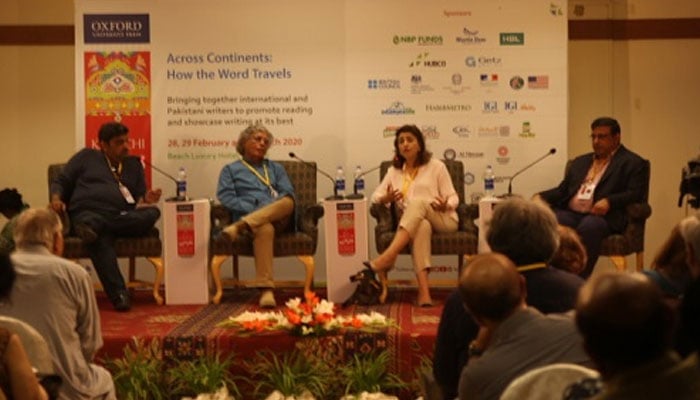‘Upper class influence doesn’t let middle class play role in politics’
There is nothing resembling a universal definition of the middle class. The middle class around the globe has heightened identity consciousness in common, and they are generally educated, upwardly mobile, and socially and fiscally conservative.
Addressing a session titled ‘The Political Character of Pakistani Middle Class’ during the 11th edition of the Karachi Literature Festival on Saturday, economist Asad Sayeed said the middle class tries to remain divergent in the struggles between the bottom and the top of society.
Concerns about the fate of the middle class are now universal. The middle class of Pakistan encompasses 40 to 60 per cent of the total population, but this class has not been a consistently strong voice in the political character.
“The middle class does not have the capacity to bring any possible societal change,” said senior journalist Ghazi Salahuddin. He said the middle class has always been used and suppressed by powerful people, who use them for their own vested interests.
Talking about the efforts to render the Student Solidarity March and the Aurat March unsuccessful, Institute of Business Administration Associate Dean Dr Huma Baqai said the role of women and the youth is the most important for bringing a change in society and to make a country powerful. The authorities are bent on creating hurdles for them instead of supporting them.
The professor said the economic condition of Pakistan has hollowed out the centre of politics, and it is one of the reasons why the middle class is not as strong as it was in the past. They are becoming less secure by the rising cost of health and education.
The problem is that Pakistan’s middle class is divided into three classes of its own — the traders, the professionals and the youth — and the politics of these groups clashes with each other.
“First of all, they have to stand united,” said Sayeed. The rise of the middle class in European history was because they fought together against the feudal culture, and brought about social and radical changes in society.
“Intellectual deprivation in the middle class is alarming,” said Salahuddin. They maintain a modern lifestyle but are conservative in thought. They stand bewildered on matters pertaining to culture, religion and politics.
Responding to a statement by an audience member that the middle class is usually never comfortable in their own skin, the senior journalist said that instead of fighting classism, the middle class should accept themselves and stand strong as agents of change to transform society. They are the most important section of society.
The Pakistani middle class cannot play a role in the political arena because it is under the influence of the upper class in society, said Salahuddin.
-
 Jennifer Aniston Already Decided Her Wedding Dress?
Jennifer Aniston Already Decided Her Wedding Dress? -
 Prince Harry, Meghan’s Hollywood Party Drama Exposes Chaotic PR Strategy
Prince Harry, Meghan’s Hollywood Party Drama Exposes Chaotic PR Strategy -
 Jennifer Garner Reacts To Savannah Guthrie's Video As Search For Nancy Guthrie Continues
Jennifer Garner Reacts To Savannah Guthrie's Video As Search For Nancy Guthrie Continues -
 Bad Bunny Leaves Fans Worried With Major Move After Super Bowl Halftime Show
Bad Bunny Leaves Fans Worried With Major Move After Super Bowl Halftime Show -
 Captain Jason Talks Personal Hardships He Faced Ahead Of 'Below Deck' Season 4
Captain Jason Talks Personal Hardships He Faced Ahead Of 'Below Deck' Season 4 -
 Anti-monarchy Group Reacts To Prince William, Kate Middleton Statement On Epstein Scandal
Anti-monarchy Group Reacts To Prince William, Kate Middleton Statement On Epstein Scandal -
 Andrew 'must' Apologize Not Wider Royal Family For Jeffrey Epstein Links
Andrew 'must' Apologize Not Wider Royal Family For Jeffrey Epstein Links -
 Super Bowl 2026: Why Didn't Epstein Survivors Ad Air On TV?
Super Bowl 2026: Why Didn't Epstein Survivors Ad Air On TV? -
 'Harry Potter' TV Series Exec Teases 'biggest Event In Streaming': Deets
'Harry Potter' TV Series Exec Teases 'biggest Event In Streaming': Deets -
 Camila Mendes Finally Reveals Wedding Plans With Fiancé Rudy Mancuso
Camila Mendes Finally Reveals Wedding Plans With Fiancé Rudy Mancuso -
 Beatrice, Eugenie Blindsided By Extent Of Sarah Ferguson’s Epstein Links
Beatrice, Eugenie Blindsided By Extent Of Sarah Ferguson’s Epstein Links -
 Girl And Grandfather Attacked In Knife Assault Outside Los Angeles Home
Girl And Grandfather Attacked In Knife Assault Outside Los Angeles Home -
 Super Bowl Halftime Show 2026: What Did Trump Say About Bad Bunny?
Super Bowl Halftime Show 2026: What Did Trump Say About Bad Bunny? -
 Piers Morgan Defends Bad Bunny's Super Bowl Performance, Disagrees With Trump Remarks
Piers Morgan Defends Bad Bunny's Super Bowl Performance, Disagrees With Trump Remarks -
 Andrew Lands In New Trouble Days After Royal Lodge Eviction
Andrew Lands In New Trouble Days After Royal Lodge Eviction -
 Instagram, YouTube Addiction Case Trial Kicks Off In California
Instagram, YouTube Addiction Case Trial Kicks Off In California




